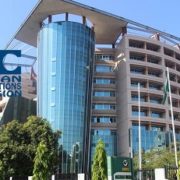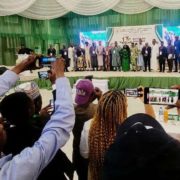As part of President Muhammadu Buhari’s human capital development objectives, the National Information Technology Development Agency (NITDA), with the mandate of developing and regulating the IT in Nigeria, has awarded 92 scholarships for Masters and Doctorate degrees in relevant areas of ICT including ICT Law for the 2017/18 Scholarship Year. This was revealed today in a press statement by NITDA and signed by its Head of Corporate Affairs and External Relations Unit, Mrs. Hadiza Umar.
The scholarship scheme was established in 2010 with the aim of bridging the digital divide through human capital development with emphasis on creating and supporting a knowledge-based economy. Two scholars are selected per state, including the Federal Capital Territory (FCT) at Masters Level and one scholar per Geo-Political Zone of the country at Doctorate Level.
The scholarship scheme is highly competitive and candidates are selected based on academic excellence and leadership qualities. Applicants go through rigorous and transparent selection process; holders of Bachelor’s degree with First Class or Second Class (Upper) Honours in any IT related field are eligible to apply for the MSc scholarships while only lecturers in any of the Higher Institutions of Learning in the country with MSc in any IT related field are eligible to apply. After application, shortlisted candidates sit for a computer-based aptitude test and two candidates with the highest scores from each of the 36 states and the FCT final interview for the MSc while only one candidate per geopolitical zone is invited for the PhD scholarship.
Through the agency’s efforts at assessing and addressing ICT skills requirements to support President Muhammadu Buhari’s sustainable economic growth and development strides through the Economic Recovery and Growth Plan (ERGP), this year, the scheme was expanded to cover diverse areas including LLM ICT Law. Furthermore, in an effort to enhance access as well as provide opportunities to both public and private Universities in the country, Dr. Isa Ali Ibrahim Pantami, FBCS, the Director General/CEO, introduced the Nigerian version of the scheme.
According to the NITDA’s Director of Human Resource and Administration, Dr. Mohammed Idris Yelwa, “this academic year, a total of 5,504 candidates applied out of which 2,188 sat for the computer-based aptitude test. The final interview is designed to assess candidates’ academic merit and exceptional character traits that will enable them maintain highest level ethical values, discipline, dedication to studies and be worthy ambassadors of the country – an innovative extension of the selection process introduced by the Director General to enhance the scheme’s credibility.”
Dr Yelwa further revealed that “each scholar studying abroad receives an average package of 17.5 million naira per annum comprising tuition fees, personal allowance to cover accommodation, living expenses and other allowances while in-country scholars receive an average of 3.5 million naira and about 752.5 million naira is spent annually on the scheme.”
From inception of the scheme to date, the agency has successfully sponsored 341 Nigerian Graduates in various ICT fields at Masters Level and 42 for Doctorate Level at Universities in the UK, USA, Canada, Germany and Australia. A number of beneficiaries of the Scheme are now in full employment while others have set up viable IT business ventures that are providing employment opportunities as well as developing globally competitive products and services, thereby making valuable contribution to the Nigerian economy.
t“We are encouraged by President Muhammadu Buhari’s commitment to sustainable human capital development for economic recovery and growth as well as the exemplary leadership of Dr Isa Ali Ibrahim Pantami in ensuring that scheme is sustained and entitlements of NITDEF scholars are paid regularly, despite the challenges of recession,” said Yelwa.
The National Information Technology Development Agency (NITDA) is an Agency of the Federal Government. The Agency was created in April 2001 to implement the Nigerian Information Technology Policy and coordinate general IT development and regulation in the country. Specifically, Section 6(a & k) of the Act mandates NITDA to create a framework for the planning, research, development, standardization, application, coordination, monitoring, evaluation and regulation of Information Technology practices, activities and systems in Nigeria; and determine critical areas in information technology requiring research intervention and facilitate research and development in those areas.





























